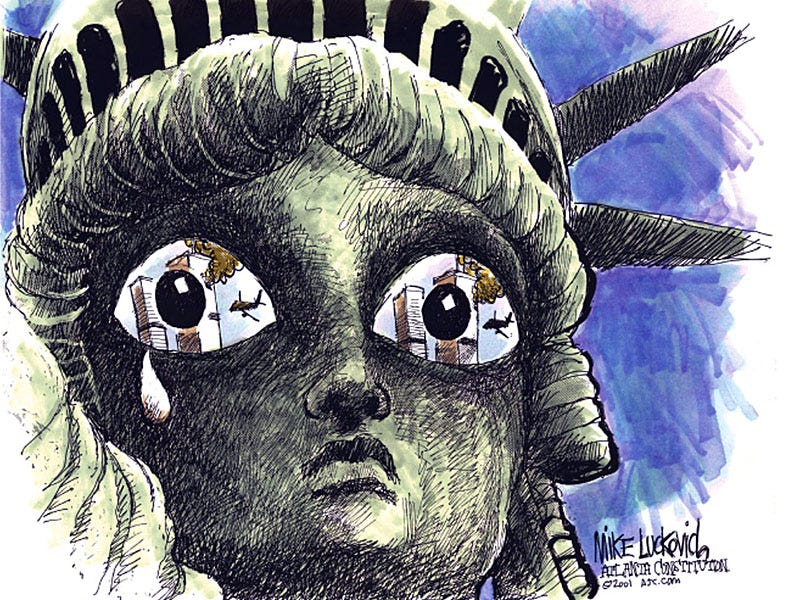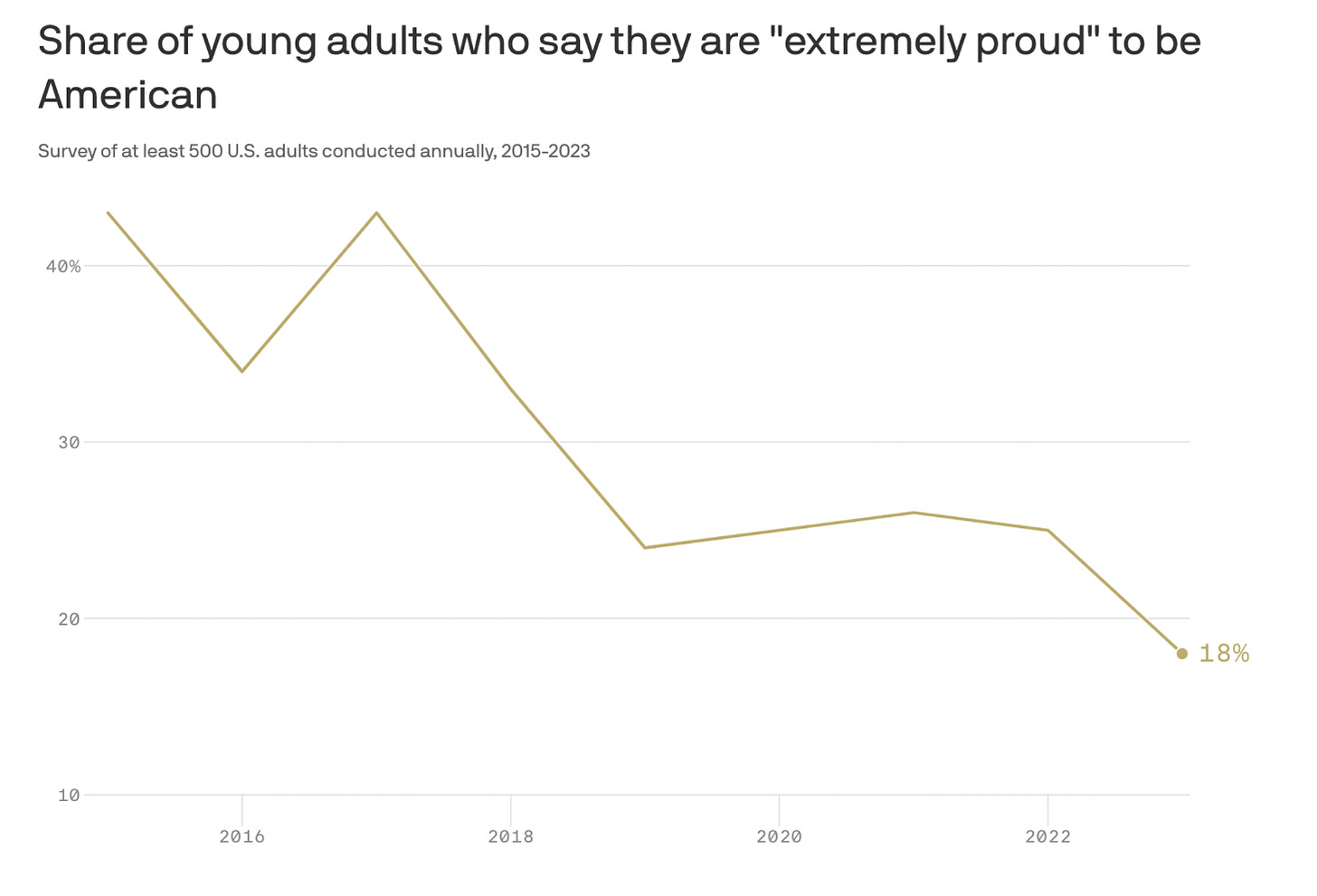An Immigrant's Love Letter to America
Twenty-three years after the 9/11 attacks, patriotism is on the decline, and most young people aren’t proud of their national identity.
Like many of you, I remember exactly where I was on Sept. 11, 2001.
I was in Atlanta sitting in my fifth grade classroom when our teacher, who had family in New York, wheeled in the TV.
She turned on CNN in an attempt to figure out what was happening, and that’s when our entire class watched live as the second plane hit the South Tower of the World Trade Center.
All the kids sat in disbelief. Our teacher started crying. At this point, I had only been in the U.S. for one year so I was trying to figure out what all this meant, but I knew it wasn’t good.
I’ll never forget the following weeks. There were moments of silence for those who lost their lives in the attacks. There was that iconic cartoon of a weeping Statue of Liberty. And there were lots and lots of American flags.
Patriotic sentiment surged in the months following. A whopping 79% of adults said they displayed an American flag in October 2001, and 65% to 70% of Americans expressed extreme pride in being American between 2002 and 2004.
Now, 23 years after the attacks, patriotism is on the decline, and most young people aren’t proud of their national identity.
Only 18% of Americans aged 18-34 are "extremely proud" to be American.
I mean, look at this chart:
As you can imagine, that pivotal event — watching the attacks in New York City on CNN — left a mark on my heart. As fate would have it, I majored in journalism, worked at CNN, and now live in New York City.
I have previously written about how much I love New York, so I will spare you, but today, I wanted to say something that may sound controversial but shouldn’t: I wholeheartedly love America.
I am part of that 18% of Americans aged 18 to 34 who are “extremely proud” to be American. My reasoning is simple: It’s because this country has allowed my family upward mobility that would be inconceivable anywhere else on this planet.
And I’m not talking about generations — I’m talking about the difference in life of one generation.
When my dad was in 6th grade, he wrote ‘USA’ on his backpack. The teacher saw it, reported it to the principal, and they called his parents. He got in major trouble because he lived in Bulgaria, a former communist country that doled out punishments for those who dared deviate from the government’s ‘allowed’ speech. (Not to mention that my dad’s family members who had spoken out against communism were killed, imprisoned, and sent to labor camps.)
His daughter (me) would go on to become a journalist working for some of the most prestigious news organizations in the world: CNN, USA TODAY, and FORTUNE magazine. Inconceivable.
I’ve seen the absurd articles about how the constitution is now reportedly “dangerous” and how identifying as a “socialist” gains you status in some parts of our society. I have no interest in being dragged into the political wars that rage on today because I don’t subscribe to any one political party, but I’m sure someone will misconstrue my words to mean something they don’t.
The truth is this: I was born in Bulgaria, and it was my home for the first 8 years of my life. The United States has been my home for the last 25. As a naturalized citizen of this country, I do not take my life here for granted.
This country is far from perfect, but it’s a nation of self-improvers. When something is wrong, people take to the streets, protest, and make sure their voices get heard.
Mark Twain once said:
“I would teach patriotism in the schools, and teach it this way: I would throw out the old maxim, ‘My country, right or wrong,’ etc., and instead I would say, ‘My country when she is right.’ Because patriotism is supporting your country all the time, but your government only when it deserves it.
“So I would not take my patriotism from my neighbor or from Congress. I should teach the children in the schools that there are certain ideals, and one of them is that all men are created free and equal. Another that the proper government is that which exists by the consent of the governed.”
So on this Sept. 11 and beyond, it’s important to remember the difference between patriotism and nationalism. Patriotism is the love and devotion to your country and its values, often expressed through pride in its achievements and a desire to improve it. Nationalism, on the other hand, is the belief that your country is superior to others without seeing a need for improvement.
As retired U.S. General Mark A. Milley said, “Those terrorists hated America. They hated our Constitution and the values that bind us together as a nation. Those terrorists wanted to destroy our country. But, on that day and every day since, the United States has demonstrated that we would never bow to fear and hatred.”





Slotozen Casino is an online gambling platform launched around 2021 that offers a large library of casino games, including thousands of slots, live dealer tables, and traditional table games from well-known software providers. It operates under a Curaçao eGaming license, which is a common regulatory framework for international online casinos, and uses encryption technologies to help protect player data and ensure fair play. The website is designed to be user-friendly and mobile responsive, allowing players to browse games and manage accounts on both desktop and mobile devices. Slotozen https://slotozencasino.co.nz often promotes various bonuses and loyalty rewards, such as welcome packages, free spins, and cashback offers aimed at attracting and retaining players. While it has a broad game selection and fast payment methods including cryptocurrency support, reviews from some players mention mixed experiences with customer support and wagering requirements.
It's concerning to see patriotism declining among younger generations, especially when reflecting on pivotal moments like 9/11 that shaped national identity. Perhaps it's a sign of changing priorities and global perspectives among youth today.
On a different note, while browsing for insights on global trends, I found some interesting Australian online casino reviews on GambleZoid https://gamblezoid.com/en-au/casino-reviews/ . It's fascinating how such platforms can connect people worldwide through shared interests. Looking forward to hearing more perspectives on this topic!